I was an early adopter of Movie Pass way back when before the shenanigans of v2’s reboot (with verbiage that all but erased the fact some of us had been using the service for years before its new “start” date). It was a reasonable $35 a month then with unlimited tickets and a customer support portal that not only worked but was instantaneous (I could message them about an error and they’d manually fill my card with money before I hit the lobby).
Greed and Wall Street ruined it—shocking, I know. The price dropped to $10 to drive up subscribers and those in charge soon discovered their plans to pivot afterwards weren’t going to get them out of the financial hole that stunt ultimately dug. Support disappeared. “Glitches” that were soon revealed as intentional ploys to sabotage consumer use took over. And full-scale throttling became a feature that ultimately led to the service’s meme-worthy demise.
So, I scoffed with everyone else when a comeback was hinted at from one of the original owners. I lol’d when reading it would be ad-based with technology that ensured your eyes were open during said ads before supplying a discount rather than full ticket price. And I, perhaps foolishly, decided to risk the $10 it would cost to see how things turned out when it finally returned with a point-based system (three tiers give you a sliding scale of points to be redeemed for tickets with leftovers rolled to the next month) anyway.
My first attempt didn’t go well. I got an error upon checking into the theater. Customer support proved to be so automated that any attempt to deviate from its stock answers was met with a “our agents will not be able to provide any further info.” And my public tweet and DM were met with silence from the company.
Turns out, however, that a reservation was made. It’s sitting expired in my reservations tab despite every attempt to check-in being met with an error. But why would I look at that tab if the app told me it didn’t work? So, maybe everything was fine and my card actually got loaded with money. I guess I’ll have to try again to find out. Fingers crossed since I can make $10 a month for two films or rollover work where AMC A-List’s $25 forced me into committing to a minimum of 3-4 screenings—an impossibility for me in this current COVID era. I’d rather the money go to local theaters like Dipson and North Park anyway.
What I Watched:
CINEMA SABAYA
(now in limited release; Israel’s International Oscar submission)
Art therapy can be a powerful tool used to dig within your own subconscious and perhaps confront personal truths about yourself and your life that you’ve repressed—either as a means to cope privately or to shield yourself from scrutiny publicly. This can be especially true when the art in question is utilized by those who’ve never attempted to use it in any form. Suddenly their minds are opened to the possibilities of fictionalization, metaphor, and abstraction. They find themselves in a space all their own to voice their emotions and feelings without the threat of retribution, argument, or abuse. But that vulnerability can also prove dangerous if the setting isn’t fully equipped to handle the consequences.
CINEMA SABAYA’s writer/director Orit Fouks Rotem creates from experience having been in Rona’s (Dana Ivgy) shoes as a filmmaker teaching a course on filmmaking with a mixed group of Jewish and Arab women in Israel for research. The point is enrichment both artistically and psychologically—to put students into a position where they can share their innermost passions and dreams via exercises that can help provide the confidence to achieve the same in reality. The reason things grow complicated on-screen isn’t therefore because of act of performing itself, but the disparity between its intent and potential. Because it’s one thing to embolden each other by revealing the struggles they face are universally fought. It’s another to exploit (wittingly or not) each other’s trust to push them past their comfort threshold from productivity to harm.
It’s a slippery slope. Rona is only supposed to show these women how to use a camera, but she’s never taught before. So, it’s no surprise that she ultimately finds herself unable to escape the headspace of a filmmaker upon witnessing the wealth of human drama and introspection that arises when people from different cultures, religions, economic backgrounds, and indoctrination collide. Whether it’s Eti (Orit Samuel) admitting her knee-jerk fear of Arabs to the point of saying she’s never spoken with one until now or Souad’s (Joanna Said) obvious discomfort whenever the subject of violence or oppression arrives and cuts very close to home, Rona is capturing important insight and catharsis simply by letting her students run with the freedom filmmaking supplies.
You could argue the film does better at presenting conflict than confronting it, but I don’t think that’s a failure to provide answers as much as it is a result of the purpose being to incite rather than solve. In a perfect world Nasrin (Amal Murkus) would connect those who need help with the right contact. Gila’s (Ruth Landau) past would help give Souad the strength to follow in her footsteps. Carmela’s (Liora Levi) untethered independence might inspire Nahed (Aseel Farhat) to pursue her desires. But this isn’t a perfect world. These women don’t fully understand the context of each other’s pain. And Rona’s wish to capture drama and epiphany has just as much chance of provoking implosion. The purpose isn’t therefore to magically solve centuries of persecution. It’s to remind us that no one is perfect. No one is unequivocally correct. And no one is truly alone.
- 7/10

GOD’S TIME
(now in limited release and on VOD)
“This movie isn’t about addiction to drugs. It’s about our addiction to the stories we tell ourselves about ourselves. We define who we are based on these tales.”
That’s it right there. Writer/director Daniel Antebi boils GOD’S TIME down to its essence of narcissism, love, insecurity, and ego mixing within the depths of three recovering addicts who’ve shared the same stories over and over again so many times that it wouldn’t be a surprise to notice a slight difference and wonder if it means the world is going to end. Why? Because the person who catches the discrepancy hopes to be the hero—even if he explains early on that he isn’t. Except, of course, he clarified that rejection with the word “super.” Dev (Ben Groh) wants to be the hero, but on his own terms. In his own story. No spandex. So, you better not ignore his role in this adventure despite realizing it’s never actually been about him.
He steals our attention as narrator by breaking the fourth wall in a way that makes it seem like he’s hijacking the film. It’s an inventive maneuver that keeps us on our toes because we can’t ever truly know where things are going. Maybe Antebi wrote it one way and Dev decides to take it another. Or maybe Dev’s decisions outside that template force his BFF Luca (Dion Costelloe) and the woman of both their fantasies (Liz Caribel’s Regina) to react in ways that hijack his hijacking. Because what’s the first thing they all do upon discovering new, “secret” information? They make it about themselves. She told him because she knew he’d tell ME, etc. And all the while their worst fears begin to come to life because they refuse to get out of their own way.
Conceived by Antebi, Groh, and Costelloe from their real-life experiences in recovery, the film is ultimately built upon a share that proves too theatrical to ignore (one the director actually heard during a meeting before never seeing the woman who said it again). It’s not enough for Regina to say she’s going to kill her ex-boyfriend, though. She’s been saying that every single time she speaks, always venting her rage before turning on a dime to say that she won’t. That she’ll pray for him instead, wish him the very best, and let God decide his fate. The reason Dev gets so riled up is because Regina forgets to say that last part. She tells the group she’s going to kill him and “that’s it.” So, in his desire to be the hero, he ropes Luca into a wild race across NYC to stop her, save her, and continue feeding his delusion.
It’s a ton of fun. Groh is the exact type of manic energy you love to witness from afar with Costelloe’s unmoving innocence and desire to not ruffle feathers proving the perfect foil while Caribel steals control in her film debut via a take-no-prisoners attitude and identity. Add “That Guy” (Jared Abrahamson) either chasing Dev or proving to be a figment of his imagination, coke fiend bosses, confused parents, and addicts in no mood to deal with Dev’s antics and the ride to the film’s gun-toting climax will definitely never bore you. Don’t think it’s just some superficial lark either, though, since these guys know this life and know the traps these characters inevitably lay for themselves. All it takes is one vantage point shift to expose how looks are often deceiving once the façade we’ve created for ourselves shatters to the ground.
- 7/10
A HOUSE MADE OF SPLINTERS
(now on VOD; nominated for Best Documentary at the Oscars)
Just twenty kilometers from the frontline in Eastern Ukraine is a children’s shelter for displaced kids of violence, alcohol, and drugs. As the social workers explain, they rarely have any vacancies with the war raging and winter looming. When one girl or boy leaves (each can stay up to nine months before returning back home, being sent to an orphanage, or being given to a foster family), another is ready to take their place. And the real tragedy is that many of those who spend time here will ultimately find their way back as a parent who unfortunately followed in the footsteps of their own. Because life isn’t getting any easier. Depression, abuse, and poverty rage on until everyone is a few bottles away from losing custody and feeding the same cycle that marked their youth.
Simon Lereng Wilmont’s A HOUSE MADE OF SPLINTERS takes a fly-on-the-wall approach to get us inside those “walls of sorrow.” Narrated in spurts by the social workers, the film itself is composed of the children—namely four in Eva, Kolya, Sasha, and Polina. We watch them plug in their cellphones to ring their parents, the odds of someone answering dwindling to zero as the days go by. Some act out in frustration. Some do everything in their power to stay positive and helpful in the hopes of finding an escape. And every time one does earn that chance to start over (either with another relative or a foster parent upon realizing their own aren’t changing enough to be redeemed), you can’t help feeling for those left behind. Because it’s not just about their own fate still being uncertain. It’s about their friends leaving and their “normal” being upended yet again.
You must commend these kids. These are impossible circumstances being captured on film regardless of whether they fully grasp what that means—especially now with an Oscar nomination adding exposure. We see some at their worst, trying to be better yet still possessed with a smirk when getting away with what they know isn’t good behavior. And we see most at their darkest, alone and contemplating a future that odds are won’t look anything like their past. Do you hold out hope that your parents will turn things around? Or do you let the courts dissolve their rights to hopefully find someone who will? These kids are barely teens and younger deciding things they shouldn’t need to decide with the help of some of the only adults who ever truly listened and cared. This is a purgatory of healing run by saints whose necessary existence proves just how damaged our world remains.
- 8/10
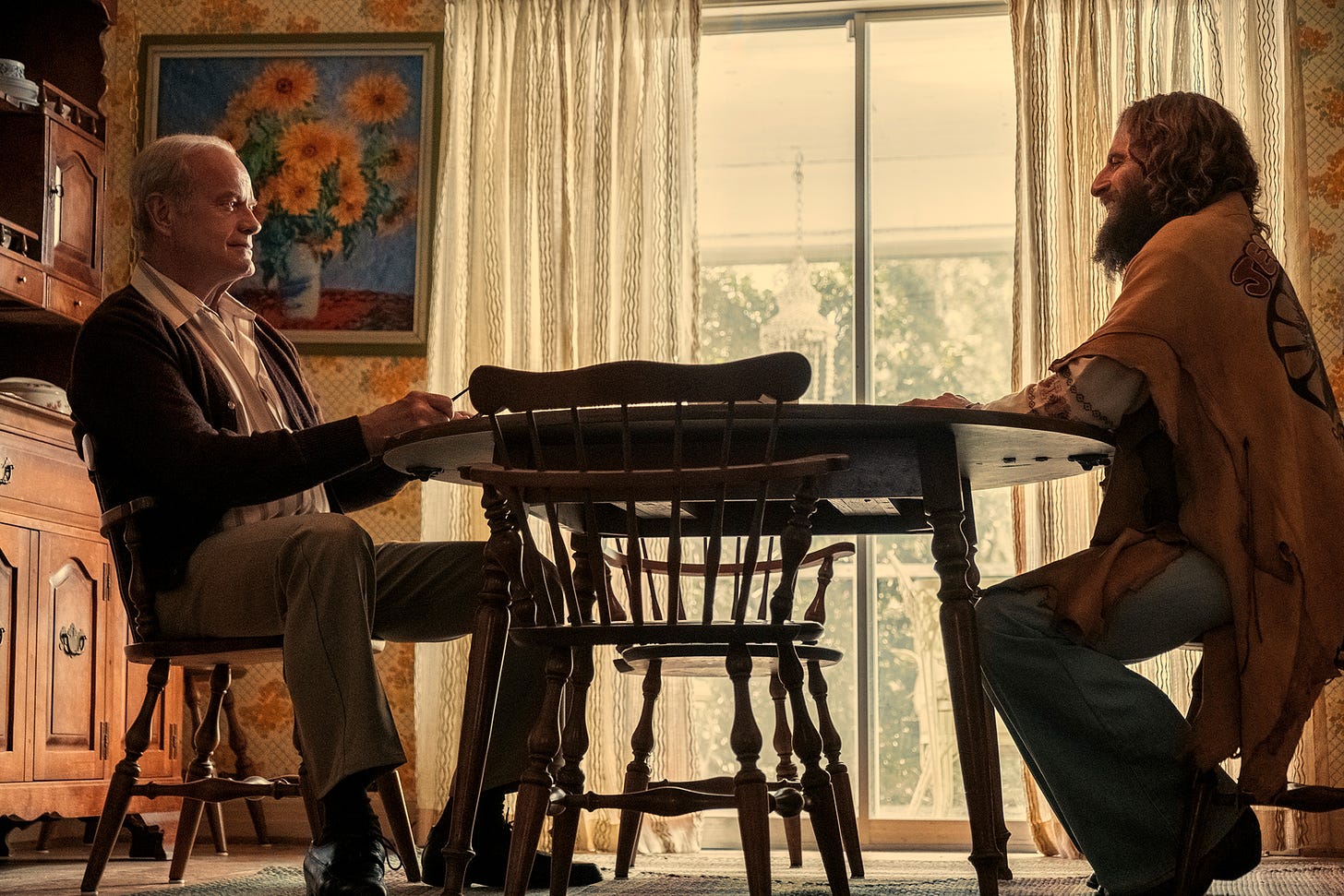
JESUS REVOLUTION
(now in theaters)
There is something undeniably beautiful about faith and the power it has to change lives for the better. And there’s also something to the comparison made in Jon Erwin and Brent McCorkle’s film JESUS REVOLUTION (adapted by Erwin and Jon Gunn from Greg Laurie and Ellen Vaughn’s book) between God and drugs. The first half of this story concerns Lonnie Frisbee (Jonathan Roumie) and Pastor Chuck Smith (Kelsey Grammer) working together to recruit hippies to church—to give them the high of peace and love they were chasing with LSD via scripture instead. Why? Because it saved Lonnie’s life. He was everything the “squares” feared. He was on his last leg. And then God awoke a new strength from within. A gift he sought to share with the world.
The movie appropriately approaches the idea that Calvary Church was turning into a cult. It mentions it in passing before brushing it away since “cults” carry a negative connotation. These kids were getting clean. They were being saved. How could that be negative? You only have to witness Lonnie’s progression from drifter to rockstar and the looks those on the outside give him once his rhetoric begins shifting from “we” to “me” to understand. We’re watching as the drug that is God takes hold. How it consumes him and alters his consciousness from sheep to butcher. I won’t lie and say I wasn’t excited for a second act portraying a monumental downfall. How could I not when Lonnie’s theatrics and ego start to push away his biggest champion (Smith) and most devoted pupil (the aforementioned Greg Laurie, played by Joel Courtney)?
Sadly, that’s not the case. All those pointed sideways glances? Oh. I guess we’re supposed to just read them as confusion. Because those figures who see through what’s happening aren’t actually seeing through it. The film wants us to believe they’re merely seeing through Lonnie’s weakness and steeling themselves to not follow that path. But reality—at least for this agnostic cynic—shows they’re really seeing through their own demise. They’re seeing the path to implosion and learning the game that must be played to prosper. Because whether or not an Evangelical started his/her congregation with good intent, looking at pictures of Laurie’s Harvest events (he’s now an Evangelical Baptist pastor) only reveals profit to my eyes. And this film, regardless of those few moments of skepticism, becomes an advertisement towards raising revenue.
That said: it’s an effective ad. It hits all the right beats with Smith finding the room to change his heart and see that his purpose was about more than preaching to an aging congregation that had learned to shut its doors to those in real need. It goes hard on God saving addicts and leaves ample room to allow their transformations to be about the willingness of the person to latch-on rather than a divine power wiping the slate clean. And how can you not enjoy a love story between a rebel from the affluent establishment (Anna Grace Barlow’s Kathy) and a poor dreamer with counter-culture passions (Laurie)? If it wasn’t all in service of public relations, I might even say it’s good. But we currently live in an era where government officials proclaim that America should be a Christian nation. Where bigots and racists hide behind religion to persecute, control, and kill.
Good propaganda might be well-made, but it’s still propaganda.
- 5/10
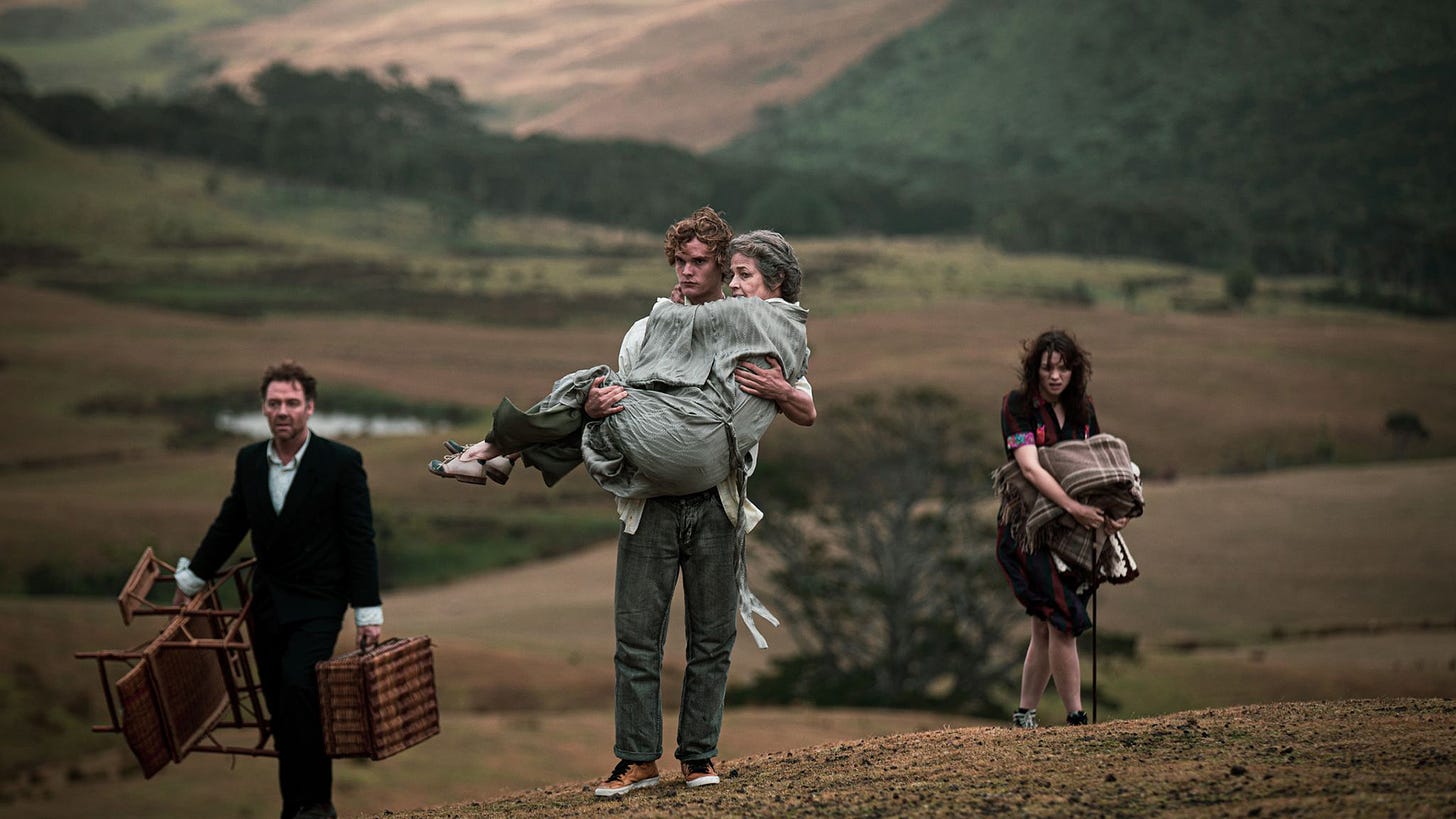
JUNIPER
(now in limited release; VOD/Digital HD on 4/4)
There’s a sense while watching JUNIPER that the events on-screen aren’t merely a fiction of the filmmaker’s mind. The way in which the darkness and shame that can no longer linger below the surface comes through to expose the complexity of these complicated characters hints at a lived-in experience—one that doesn’t need exaggeration or saccharine subterfuge to make it make sense. So, it’s no surprise to learn Matthew J. Saville drew most of what we see from his own life. His abrasive grandmother had a fall, breaking her femur and forcing her to come stay with them. And he lived in the so-called “suicide capital” of New Zealand, unfortunately knowing many people who tragically took their lives. But rather than judge or chastise, he honors their memories with a story that’s less about hope for the future than acceptance in the present.
Sam (George Ferrier) is our suicidal teen lead who’s barely hanging on at boarding school when he isn’t drunk. The reasons why will soon be revealed, but for now we simply watch him sulk and prepare for his late mother’s birthday to join her in oblivion. Except an unexpected wrinkle gets thrown into the mix. His British father (Marton Csokas’ Robert) has agreed to let his own mother (Charlotte Rampling’s Ruth) stay with them to convalesce from a bad injury that has kept her stuck in a wheelchair in England. The two don’t talk. Sam has never even met her. It therefore appears to be one big messed up family stuck together to endure each other’s resentments as they continue to build the emotional walls that already separate them even higher. With a lot of gin and a desire to fight, they might shift the tide.
The result is a rather poignant and authentic film centering the psychological toll of difficult lives (relatively speaking, but no less potent than each other’s) rather than the goal to ease their pain. That exists too, but as a byproduct of their strength and willingness to deconstruct the games society so often demands we play in lieu of confronting the truth. This is Ferrier and Rampling’s show, their rapport a powder keg of violent stubbornness that needs to be worked out to move beyond. Because ignoring it with silence only lets the fear driving their actions to fester. Saville says it best in his director’s statement: “An old woman is able to let go and die, and a young man deals with his grief, and lives.” They see redemption in each other. An avenue to right past wrongs if only in the sense that it may finally let them forgive themselves. It’s all any of us can hope to do.
- 8/10
MOGOADO
(now on VOD)
Passed out on the sandy shore of Santa Catarina, Brazil, Beto (Diego Álvarez) finally gets to his feet and stumbles home. What follows is a mostly wordless look into his day-to-day of fishing, selling to local bars in town, and gambling with dominoes at a table run by a man to whom he already owes money. Things appear to rinse and repeat until a stranger is seen in the distance. We’ll never know the specific details as to why Beto suddenly grows afraid, but we can guess from his violent temper at the sound of this man calling him by a different name. It therefore seems Beto is in hiding and living this simple, drunken life to forget the past he’s left behind. Unfortunately, that past isn’t yet done with him.
Rubén Sainz’s MOGOADO soon reveals Beto’s estranged son Markel (Aram Rockenbach), recently arrived from Spain, with the teen getting some of that rage after calling him by that other name too. Not only does Beto demand they speak Portuguese and that the boy call him Alberto, but he also says he’s to now go by Marcelo. Where then does the danger reside? There or here? Would one person uttering his real name truly spell his demise? It’s not a spoiler to say we’ll never find out because Beto’s past isn’t really important here. This is a very sparse narrative about this estranged relationship between father and son and the former’s fear of living for someone other than himself—not a fear of dying.
How we get to that truth is pretty disjointed. For example: there’s no evidence that Beto has a girlfriend. If not for another woman randomly inquiring about her, we’d never assume to ask the question ourselves since we’re specifically told he’s alone. But there she is to give him a kick in the pants when he needs one the most—the plot always pulling someone out of the woodwork when it needs them before once more forgetting they exist. It often feels as though we’re intentionally being left in the dark, but not as a means of shielding information. It’s more that Sainz doesn’t want to waste our time with context. He seeks efficiency, sometimes streamlining things to the point of confusion if not an overall indifference.
Thankfully, regardless of my mind drifting throughout, the cinematography always brought me back. Shot with a vertical aspect ratio, Sainz captures some unforgettable images—the beach scenes are particularly gorgeous with a sand-surfing sequence proving a lot of fun too. Because the film must be taking place in this veritable paradise for a metaphorical reason, we assume the claustrophobic nature of the central dynamic will eventually find an equal release. There will obviously be bumps along the way (Beto is barely trying to be a father), but sometimes people need to be reminded of what they’ve lost before realizing what they want. I only hope the ending’s callback to the start isn’t doing what I think it is. Because introducing the possibility of “fantasy” renders the whole an anti-drinking ad rather than a drama about humanity’s drive to be better that made MOGOADO’s slow burn worthwhile.
- 6/10
MY HAPPY ENDING
(now in limited release)
You’ll have to excuse everyone for not believing that anything Julia Roth (Andie MacDowell) says comes from a place of measured clarity. This is a woman used to getting what she wants whether on a film set, in a hotel lobby, or, apparently, the infusion ward of a remote hospital in England. That her first demand when arriving for her initial chemotherapy session is confirmation she’ll be getting a private room rather than any inquiries into what the procedure entails or what she should expect tells us everything we think we need to know about her. But that would be too easy. Vain. Entitled. Delusional. Julia can be all those things and still earn our attention when finally confronting what it is that’s happening. Because that reality is coming regardless of who she is or what she has planned. We all absorb impossible news in our own unconventional ways.
That truth is what rises to the top for me during Tal Granit and Sharon Maymon’s MY HAPPY ENDING. Adapted by Rona Tamir from Anat Gov’s based-on-her-own-cancer-experience play, it’s easy to assume its story of tragic circumstances will find itself moving towards a clichéd notion of empowerment and hopeful optimism. It’s why you get a welcome mix of supporting characters like Sally Phillips’ “cancer can be a miracle” Mikey, Miriam Margolyes’ “I’m going to be cancer’s cancer” Judy, and Rakhee Thakrar’s “God saved me by compounding my hardships to tell me I was dying” Imaan. Put their eclectic backstories together and you have a perfectly quirky trio of voices to put Julia on the correct path to recovery via humor and tough love. If only life were so neat and tidy.
The film understands these women aren’t created equal. Their cancers are at different stages and they possess different responsibilities and ways of life to reconcile with the inevitabilities of the disease and treatment. So, now that Julia cannot avoid facing the fate life dealt her, listening to their motivations and dreams and desires aren’t about creating a mirror. It’s about creating context that she can personally interpret and weigh to come up with a completely opposite result. The obvious question is thus whether that decision is considered or a whim. That’s why her doctor (Tom Cullen) and best friend/manager (Tamsin Greig) are here to help push back and force her to really think about it. That role allows Greig to steal the whole thing with a devastating performance masked beneath a “brave face.”
Stage adaptations are a tough sell for many, but I love them. Especially when the filmmakers use the medium to augment set pieces like these women’s “holidays”—collective imaginary worlds into which they retreat whenever one is overtaken by pain. The entire story occurring in one day makes the dialogue-heavy nature and virtually one-room setting work too, allowing the actors to sell the drama via their instantaneous reactions since there’s nowhere to hide. The curtains and doors can’t even block the sound of what they’re saying about each other. That’s good, though, since cancer and death are the great equalizers. Once the artifice of life and expectations is torn down, all that remains is the person careening towards oblivion. So, no matter how impulsive (or crazy) their response, honesty won’t be denied.
- 7/10
Cinematic F-Bomb -
Increased the Oscar F-Bomb page’s totals with six more of this year’s Best Picture nominees, including David Lynch from THE FABELMANS. (Substack apparently can’t handle an embedded gif, so you’ll have to click over for a smoother experience. Or see everything at cinematicfbombs.com.)

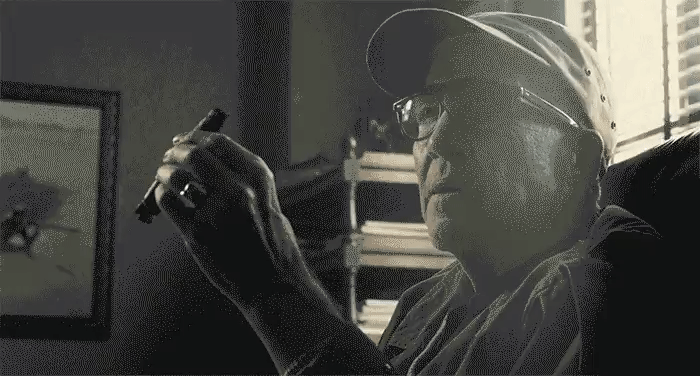
New Releases This Week:
(Review links where applicable)
Opening Buffalo-area theaters 2/24/23 -
BUNKER at Regal Elmwood & Quaker Crossing
COCAINE BEAR at Dipson Amherst, Capitol & Flix; AMC Maple Ridge & Market Arcade; Regal Elmwood, Transit, Galleria & Quaker Crossing
EMILY at North Park Theatre; Regal Transit & Quaker Crossing
“EMILY is a gorgeous film—emotive, thrilling, and also quite charming whenever it pairs Emily up with another to wryly smile while others scowl at them. Mackey performs the role with an infectious energy that runs through the highs and the lows.” – Full thoughts at HHYS.
JESUS REVOLUTION at Dipson Capitol; AMC Maple Ridge; Regal Transit, Galleria & Quaker Crossing
Thoughts are above.
SELFIEE at Regal Elmwood & Galleria
Streaming from 2/24/23 -
ALCARRÀS - MUBI on 2/24
BRUISER - Hulu on 2/24
NOCEBO - Shudder on 2/24
“While everything you can probably guess early on does more or less come to fruition, it won't be entirely in the way you thought. Because karmic retribution can create as well as destroy.” – Full thoughts at The Film Stage.
WE HAVE A GHOST - Netflix on 2/24
SPOONFUL OF SUGAR - Shudder on 3/2
Now on VOD/Digital HD -
TELL IT LIKE A WOMAN (2/18)
BROKER (2/21)
“With fantastic performances and an intelligence to the storytelling that refuses to sacrifice authenticity for happy endings, he's showing us society's flaws while highlighting those best suited to fix them: the ones harmed most by their injustice.” – Full thoughts at HHYS.
CALENDAR GIRLS (2/21)
EO (2/21)
“Sadly, like Balthazar, EO just wasn't for me. Because while the whole is enjoyable, it's also fleeting. I'm glad to have experienced the journey, but that's it.” – Full thoughts at jaredmobarak.com.
HOLY SPIDER (2/21)
“The production value, performances, and underlying themes are enough to warrant a watch despite any letdown [in the final act].” – Full thoughts at jaredmobarak.com.
A HOUSE MADE OF SPLINTERS (2/21)
Thoughts are above.
KNOCK AT THE CABIN (2/21)
“The performances that Shyamalan coaxes out of his cast are extraordinary. And not just that of Bautista who has rightfully earned the majority of praise due to a career-best turn.” – Full thoughts at HHYS.
LAMYA’S POEM (2/21)
LET IT BE MORNING (2/21)
“Could it be more biting? Sure. A bit more anger would have done it well. You still cannot deny its effectiveness as is, though—especially if that restraint helps earn the eyeballs of those who need to watch it.” – Full thoughts at HHYS.
THE LONG DARK TRAIL (2/21)
MAROONED AWAKENING (2/21)
THE WHALE (2/21)
“Because without Fraser and Chau's performances, that's all this really is: a shallow plea for kindness in a world so cynical that people have grown less accepting than they already were in hopes that God gives them a reserved seat at the apocalypse.” – Full thoughts at HHYS.
THE WRAITH WITHIN (2/21)
WOMEN TALKING (2/21)
“It may just be eight women and their minutes-taker arguing in one room for the duration, but it's the most dynamic and tense film I've seen all year. Foy is a force of nature.” – Full thoughts at HHYS.
AFTER LOVE (2/24)
ALCARRÀS (2/24)
DEVIL’S PEAK (2/24)
GOD’S TIME (2/24)
Thoughts are above.
MEET ME IN THE BATHROOM (2/24)





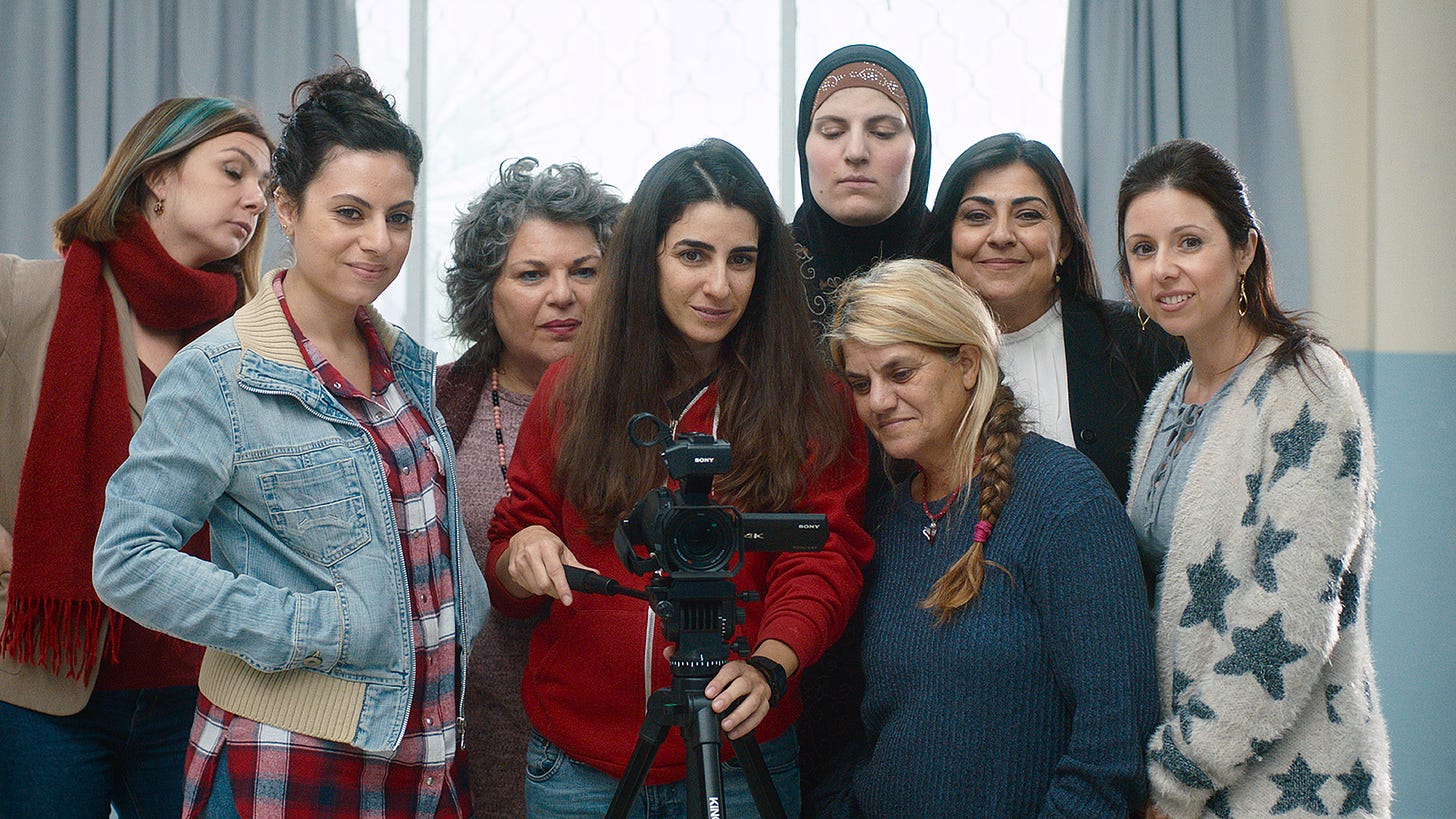
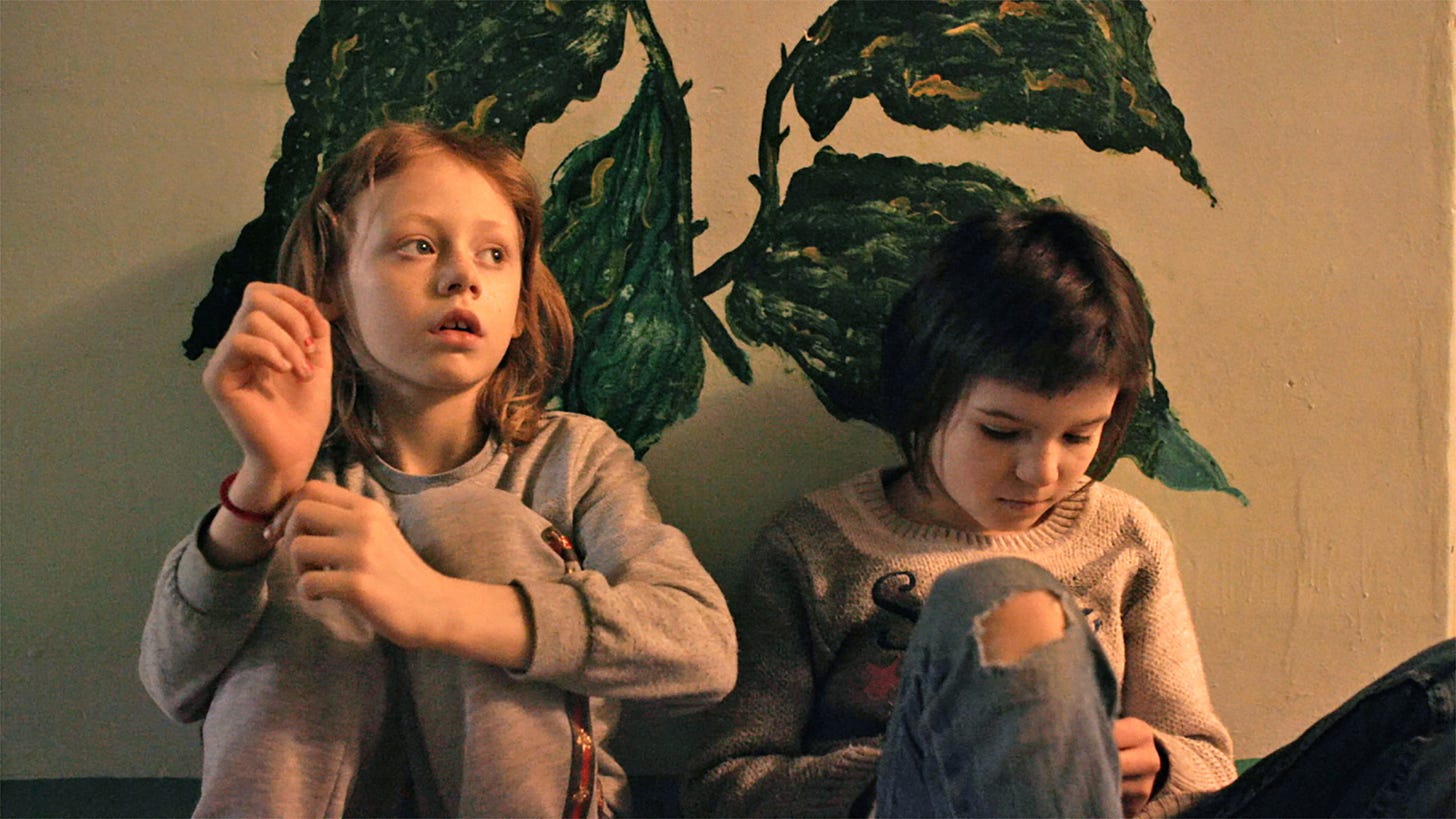

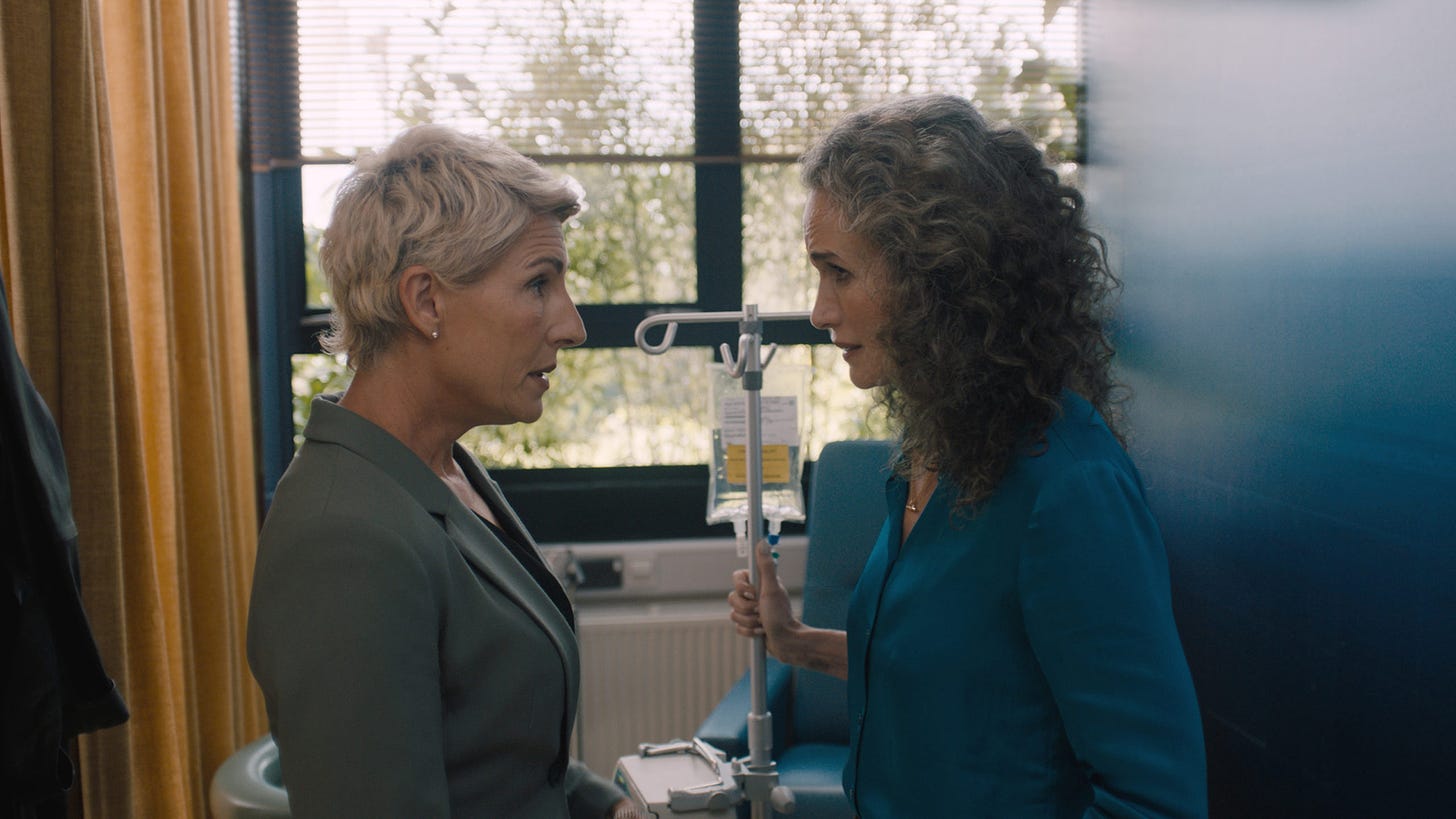
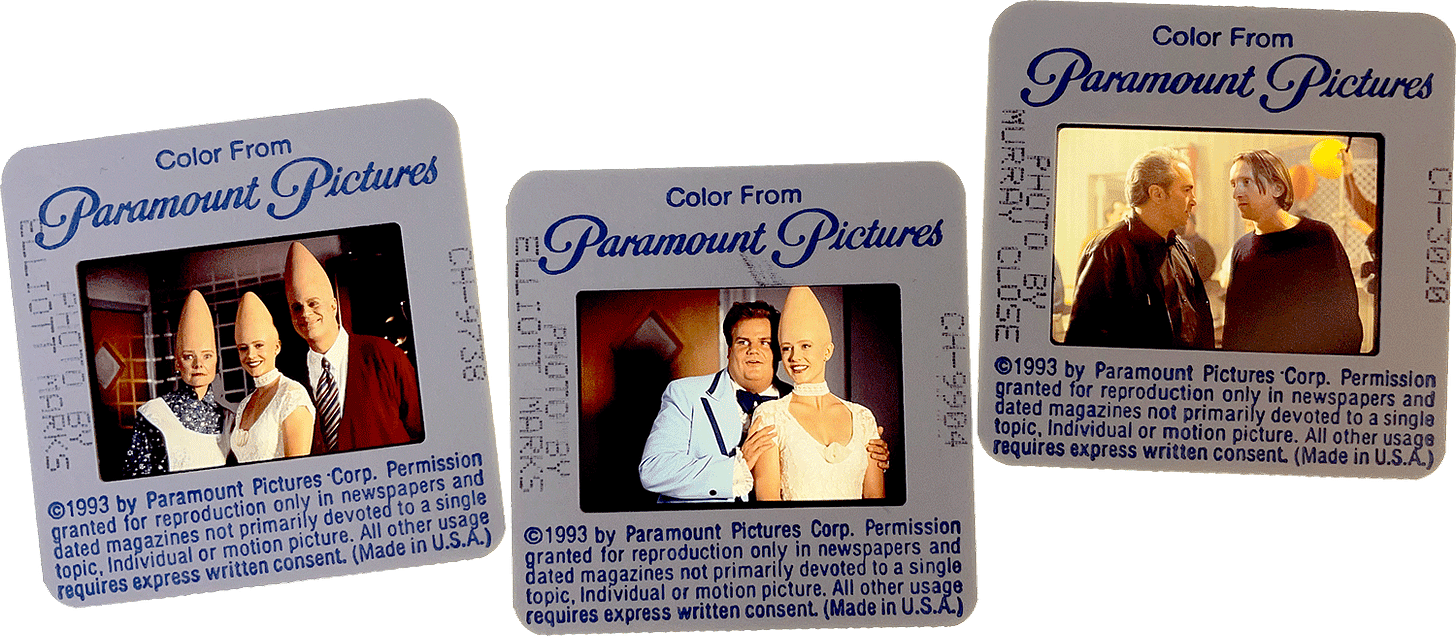
"But we currently live in an era where government officials proclaim that America should be a Christian nation. Where bigots and racists hide behind religion to persecute, control, and kill." A little over the top and dramatic, but yes there are people like that. But, you are allowing a few bad apples make you miss the bigger picture and truth. And your quote above defines the religion of liberalism and our government today.
Very strange review.